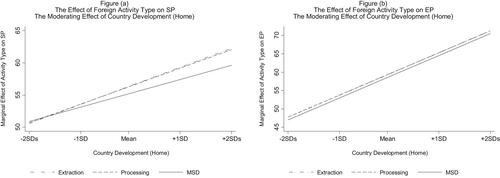This article examines how different international diversification strategies impact the legitimacy challenges multinationals face and the way they manage their corporate and social responsibilities. Analyzing these questions in a sample of companies in extractive industries, we find that those who pursue resource-seeking investments that involve locating extraction operations overseas respond with the largest improvement in their corporate-level social performance (CSP). Those pursuing efficiency-seeking by establishing processing subsidiaries abroad increase their CSP less, with the smallest increase for those pursuing market-seeking through marketing and sales operations overseas. For each type of activity established overseas, the increase in CSP becomes greater the more developed the company's home country and the larger its international footprint, but is not dependent on the host country's level of development. These findings suggest that, in today's globalized world, the legitimacy challenges that result from subsidiaries' activities increasingly need to be managed at a global, corporate level.
This article investigates the relationships between different international diversification strategies, the different legitimacy challenges they create, and corporate-level social performance (CSP) responses. For multinationals operating in the extractive industries, we find important legitimacy spillovers from different types of subsidiary activities on the corporation, but these also vary, leading it to respond with differential increases in global CSP. These increases are greatest for resource-seeking diversification, involving the location of extractive activities abroad, moderate for efficiency-seeking diversification, involving the location of processing activities and least for market-seeking diversification, involving the location of marketing and sales activities. For each type of subsidiary activity, we also find that the increases in CSP are larger the more developed the company's home country and the larger its international footprint, but are not dependent on the host country's level of development. We show how these results extend existing theory and draw implications for management practice.



